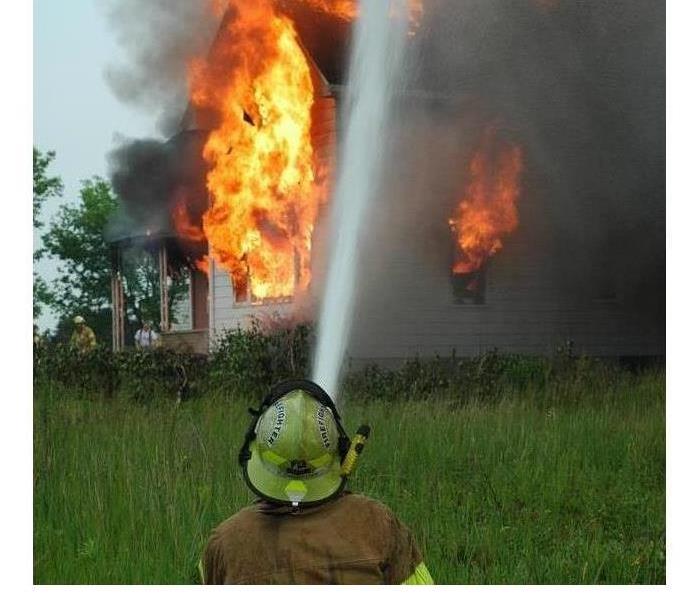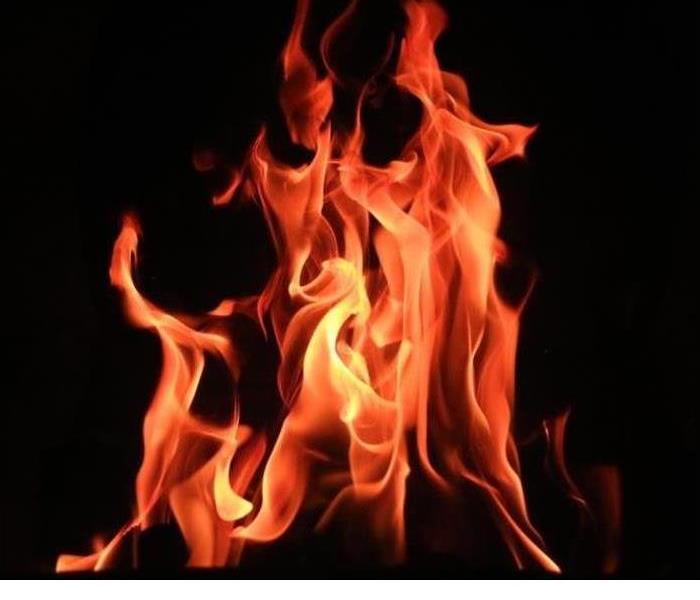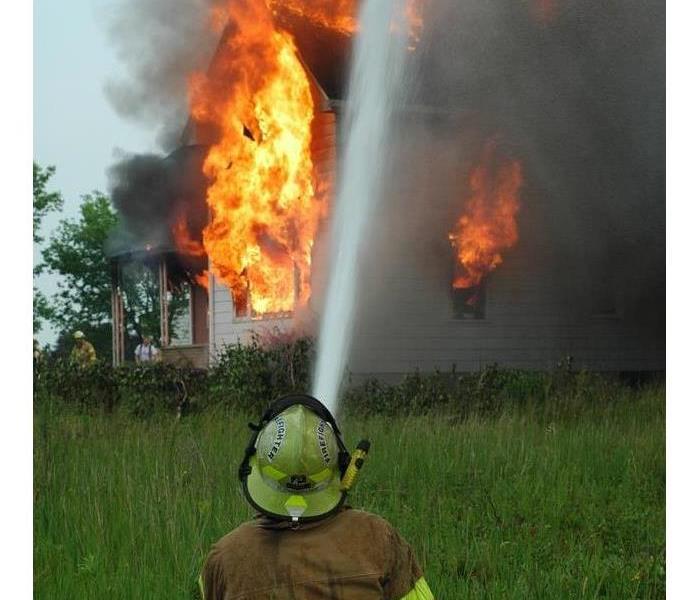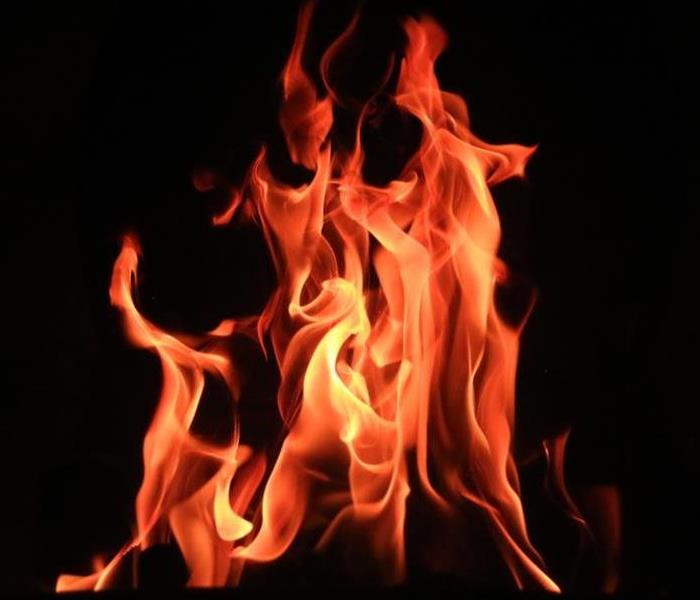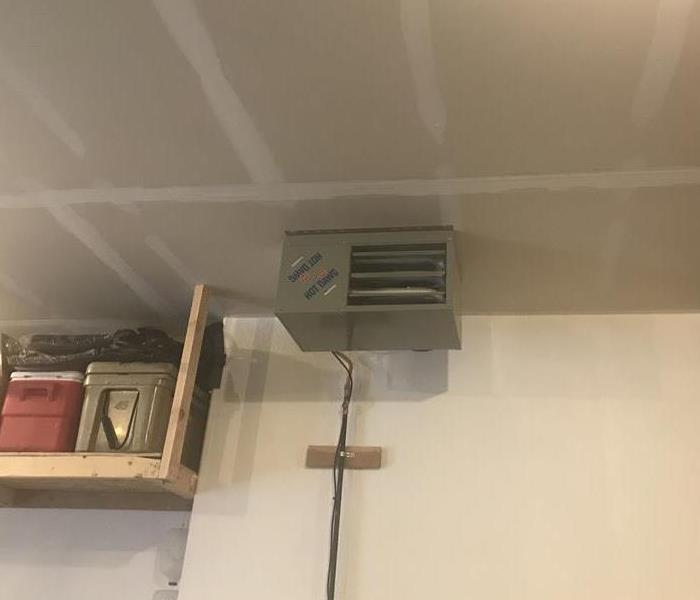Recent Fire Damage Posts
Fire Damage Restoration with SERVPRO of Bath: Introducing Our New Contents Division
7/10/2024 (Permalink)
 Restoring heavily sooted walls to their original condition with advanced cleaning techniques.
Restoring heavily sooted walls to their original condition with advanced cleaning techniques.
Introducing SERVPRO of Bath's New Contents Division
Experiencing a fire can be devastating for any property owner, especially for businesses. The damage caused by a commercial fire can lead to significant losses, forcing a business to close temporarily or even permanently. SERVPRO of Bath is here to help with our new Contents Division, providing comprehensive restoration services to ensure your business can recover quickly and efficiently.
When a fire occurs, the damage isn't limited to just the building. Contents within the property, including valuable items and important documents, can be affected by smoke, soot, and water used to extinguish the fire. Our new Contents Division is equipped with the most advanced, cutting edge, allowing us to restore a wide range of items to their preloss condition. From textiles and heirlooms to documents and sports equipment, we have the expertise to handle it all.
End-to-End Restoration We meticulously document and inventory all affected items before carefully packing and transporting them to our own, in-house facility. This ensures that everything is accounted for and handled with the utmost care.
Our services don’t stop at cleaning. We also offer comprehensive restoration and reconstruction services to get your business back to normal as quickly as possible. Our team is available 24/7 to respond to emergencies and provide the support you need during this challenging time.
Why Choose SERVPRO of Bath?
- Comprehensive Services: From fire damage restoration to content cleaning and storage, we handle it all, ensuring a seamless process for our clients.
- Community Commitment: As a trusted partner for over 130 insurance clients and 400+ major commercial accounts, we bring industry-proven expertise to safeguard your property.
Contact SERVPRO of Bath today to learn more about how we can help with your restoration needs.
Washington, NC Fire Damage Remediation Experts
8/23/2022 (Permalink)
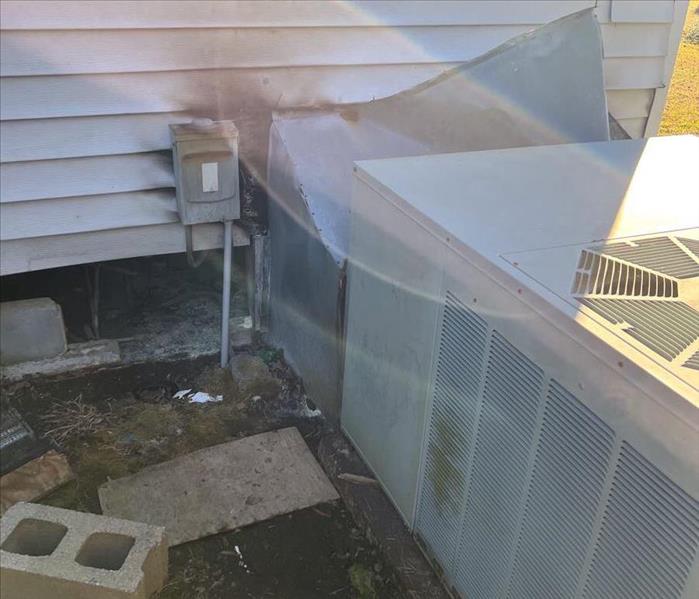 Regardless of the cause of fire, smoke damage can be tricky to handle properly. Let the experts take care of you!
Regardless of the cause of fire, smoke damage can be tricky to handle properly. Let the experts take care of you!
If a fire damage has impacted your home, please call fire damage restoration professionals. Doing so can help limit structural damage, prevent mold, and get your home back to normal as quickly as possible. For fire damage restoration services, you can trust SERVPRO of Bath. Here are just a few considerations after a structural fire:
1. Emergency Response. Once you call us for service, we will respond quickly. We'll ask the questions necessary to ensure that we can address the challenge you're facing, then we'll send the people and equipment needed to face the task.
2. Inspection And Assessment. Upon arrival, we'll assess the damaged areas to determine the extent of the damage and make a plan to properly clean the fire and smoke damage from your property.
3. Water Removal. If water was used to extinguish the fire, we will work to remove the water as quickly as possible using specialized equipment, such as extractors, air movers, and dehumidifiers. This step minimizes the risk of additional structure damage and mold growth.
5. Soot and Smoke Removal. Our crews are skilled in removing soot and smoke using specialized equipment and techniques.
6. Cleaning and Deodorizing. Restorable items will be cleaned and deodorized. Deodorization is typically accomplished utilizing air scrubbers and foggers.
We live and work in this area -- we might even be your neighbor! SERVPRO of Bath is locally owned and operated. We're ready to respond, so call us for your fire damage restoration and remediation needs 252-923-7205.
Fire Safety Tips for Washington, NC
8/1/2022 (Permalink)
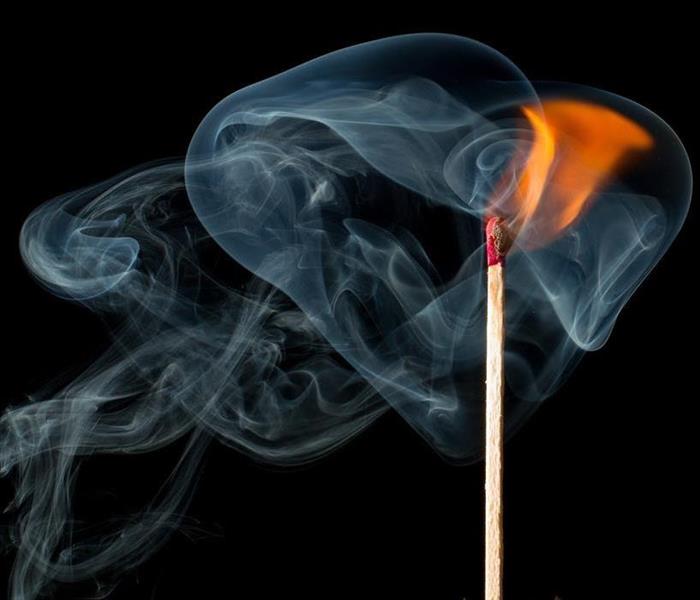 Always be careful with combustibles in the home.
Always be careful with combustibles in the home.
According to the National Fire Protection Association, Each year in the United States, more than 3,000 people die in fires and more than 16,000 are injured. It's crucial to be aware of the dangers of fire and what you can do to prevent one from happening in your home.
Here are some tips to help keep you and your family safe from fire.
- Install smoke alarms on every level of your home and outside of sleeping areas. Check them monthly to make sure they're working properly.
- Create and practice a home fire escape plan so everyone knows what to do if a fire starts.
- Keep flammable items like lighters and matches out of reach of children.
- Don't leave candles burning unattended.
- Don't smoke inside your home.
- Be mindful of device energy usage--don't overload electrical outlets.
- Keep your stove and oven clean and free of grease build-up.
- Don't leave pots and pans unattended on the stove.
If a fire does occur in your home, try to stay calm and get everyone out quickly. Use your practiced escape plan to get to safety. If you can't get out, go to a room with an outside window and wave a white cloth or flashlight to signal for help. Never go back inside a burning building.
After a fire occurs, be sure to call professionals like those at SERVPRO of Bath to handle all of your restoration and remediation needs.
How To Prevent and Put Out a Grease Fire
3/14/2022 (Permalink)
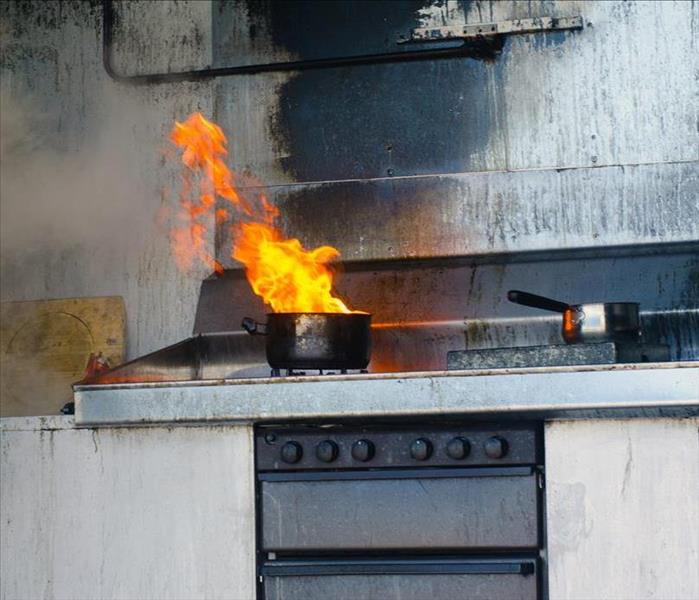 Learn More about How To Prevent and Put Out a Grease Fire in your Bath, NC home.
Learn More about How To Prevent and Put Out a Grease Fire in your Bath, NC home.
When it comes to home fires, cooking fires top the list of culprits. Many statistics indicate that there are more than 5,000,000 a year, though many are small ones. If a grease fire happens in your Bath, NC home, it can quickly escalate and requires a professional fire cleanup company to return your kitchen to normal.
Knowing how to prevent them and safely extinguish are essential to minimizing the damage.
Prevention Tips
While cooking, different oils and greases have different flashpoints. Simply setting the burner too high or letting grease buildup in the oven are sure ways to enhance the chances of a fire happening. Below are key ways to prevent that from happening.
Never leave cooking unattended. While it may not seem like a big deal to leave the room to quickly check on something, a fire may start in seconds. When using oils and grease, it’s especially important to diligently watch the stove. Boiling oil or smoke are indicators that a fire may start.
Understand what oils you are cooking with and know their flashpoints. Regardless of the oil, heat it slowly to minimize potential risk.
Ensure any combustible materials are safely stored away from cooking areas. Any spills or residue from boiling over should be properly cleaned to avoid buildup.
Keep a lid nearby. Even if you don’t need it for the dish you are cooking, keep it within arm’s reach just in case.
Have a fire extinguisher stored in the kitchen and know how it works. It is recommended to keep a Class K or B in the kitchen.
Safely Extinguishing the Flames
While cooking safety may help prevent a grease fire, one may still happen. When that does, take the following steps to properly extinguish it.
Never use water or move the pot or pan. Water or excess movement will only cause the flaming grease to splash, increasing the chances of the fire worsening. Baking soda or salt should be used to smother the fire instead, though it often requires using a lot of them. At the first signs of trouble, turn the heat source off. If it happens in the oven, don’t open the door. This helps ensure the fire doesn’t get the oxygen it needs to spread.
If you followed the preventive tips above, you will have a lid nearby that you can put over the flames. It is recommended to use a metal lid or baking sheet instead of glass or ceramic, which may shatter. Never use anything that is flammable, such as an oven mitt or towel.
If the fire persists, grab the fire extinguisher. Ensure it is not a Class A, which is water-based. Extinguishers that are classified as ABC are also safe to use. After the fire is out, remember that additional cleaning will be needed to clean up the residue left behind.
Ideally, it is best to avoid a grease fire altogether. Even when taking preventive steps, accidents may still happen. If that occurs, know the proper way to extinguish this type of fire to avoid it spreading and causing more damage.
What Is Content Cleaning?
2/24/2022 (Permalink)
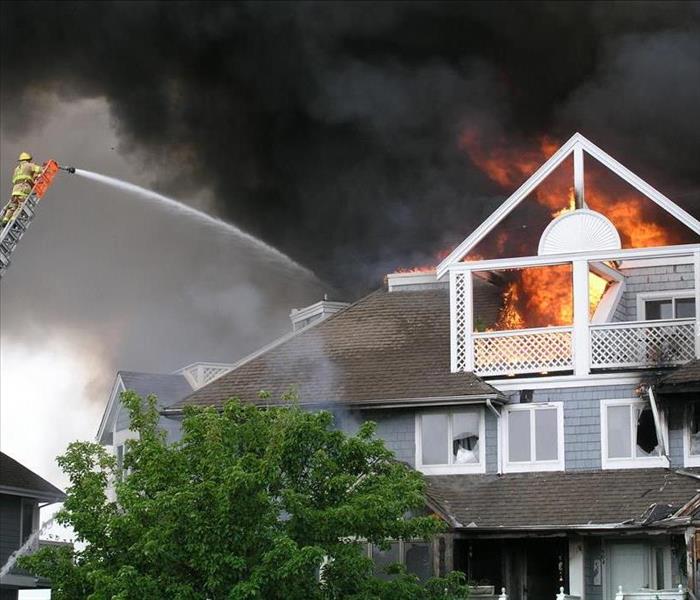 Follow These Important Tips about Content Cleaning and be prepared if Fire Damage occurs in your Bath, NC Home.
Follow These Important Tips about Content Cleaning and be prepared if Fire Damage occurs in your Bath, NC Home.
Content cleaning includes the practices and techniques used by restoration services in Bath, NC. The cleaning services can consist of dry-cleaning and other methods. The specialty cleaning is typically only required in disaster situations, including:
While many people might assume objects are lost to disasters, many specialty cleaners can work apparent miracles to restore some items to like-new condition. Even if complete restoration is not possible, these professionals might be able to make significant improvements so that sentimental items can still remain with families as heirlooms.
Using Dry-Cleaning and Other Techniques for Salvaging Content
Before content can be salvaged, it must be freed from the disaster site. If the items were in a flood, then water must be excavated so restoration companies can assess the damage. If a fire occurred, remediation efforts could include water removal and smoke removal.
Any item will need to be put into content storage to ensure it remains safe until an expert restorer can work on it. Some things will require more delicate operations. For instance, paper is one of the most vulnerable items to attempt to salvage. Both water and fire can do significant damage to documents. When trying to recover paper documents from a flood, a restoration service will often seal them in a freezer or temperature-controlled storage unit until they can be officially processed.
All materials and items require unique cleaning techniques; for example, porous items, like clothes can often undergo dry-cleaning to salvage the materials. However, ultrasonic cleaning options are most useful for non-porous items and surfaces.
Experts Will Determine the Best Cleaning Options
As a homeowner, you will have enough to worry about with the claims and restoration process. Remediation services do not expect homeowners to know how to salvage or repair items.
These services want homeowners to relax as much as possible, so they will take them through the damage to discuss the salvageability of items. They will also want to know which items are most important to you and your family because they will do anything in their power to save sentimental items.
Leave the salvaging to the experts, however. You do not need to do additional research. Put down your phone and step away from Google search. The professionals will let you know what items they can save and which they cannot. It is best to trust their opinions.
Safety Is Paramount
The experts want to ensure that anything that remains in your home is safe and not a health threat. People often want to keep everything will sentimental value, even if it is not safe.
Porous items exposed to black water should be discarded. There is relatively little that can be done to salvage the objects. Experts will explain this and encourage homeowners to listen.
Cleaning contents after a disaster involves several specialty techniques, including dry-cleaning. The purpose of hiring professional restoration services is so they can help clean and repair the property and advise you on what is salvageable and what should be discarded. If you experience a fire, do not hesitate to hire a restoration service that can help you make the tough choices.
Keep Your Home and Family Safe From a Grease Fire
1/6/2022 (Permalink)
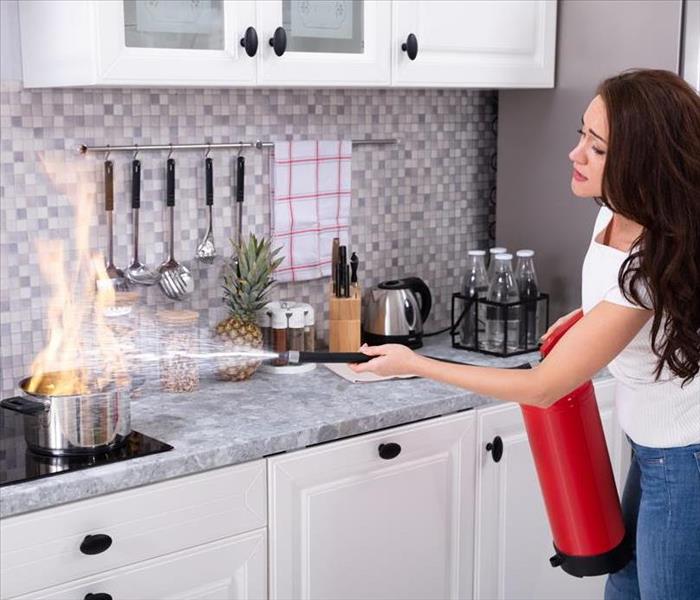 Follow these tips to prevent Grease Fire in your Bath, NC house. If any doubt arises, please contact us.
Follow these tips to prevent Grease Fire in your Bath, NC house. If any doubt arises, please contact us.
A lot of house fires happen in the kitchen, and a large percentage of these happen because of the grease, fat, or oil used during cooking. It doesn't take long for a grease fire to spread from the kitchen to the rest of the home, so a fast reaction is important. However, you can't treat a grease-based fire the same way you'd respond to other fires.
How To Prevent and Respond to a Grease Fire
If you pour water onto a grease fire, the liquid splashes and spreads, carrying the flames with it. Before you break out your deep fryer, make sure you understand how to prevent fire damage in your Bath, NC kitchen:
Keep Your Work Area Clean
Store combustible materials, such as flour containers and dishcloths, away from your cooking space. Wipe up spills when pots boil over and remove grease buildup from the stovetop and oven. Recipe books, pieces of paper, and other items that tend to gather on the countertops should be cleared away before you start cooking.
Never Leave Cooking Unattended
A pan of vegetables warming in butter can become a fire hazard if the temperature reaches just 300 degrees Fahrenheit and you aren't on hand to turn the heat down. The various fats, oils, and greases you use in cooking all have different flashpoints, so watch for smoking, spitting, and boiling to determine when you should reduce the heat.
Prepare for Grease-Based Fires
Fires require oxygen, so the fastest way to put out a grease-based fire is to cover the entire thing with a metal lid or a baking sheet. Depending on the size of the flames, you may need to use some metal tongs to hold the lid in place. Glass or ceramic lids could shatter.
Store a container of baking soda or salt next to your cooking area. You'll need a lot to put out the fire; a #10 can is about the right size. Do not use flour, baking powder, or other powders because these are often combustible and could cause further damage.
Keep a Class K fire extinguisher in the kitchen. This extinguisher is designed specifically for cooking fires. You cannot substitute other extinguishers because some of those are water-based. Reach out to your local fire department for more information on fire extinguishers, such as how to use them and how often to arrange maintenance for your extinguisher.
Practice Safety Habits
Remember to never use water for grease-based fires; don't put your burning pan into the sink. If you can't put the fire out with a pan lid, baking soda, or extinguisher, contact 911. For the best results, teach your family members how to respond to grease-based fires and how to use the fire extinguisher.
Kitchen fires, and the grease fire specifically, can be very scary. Make sure you and everyone in your family know how to prevent fires, how to respond in case of a fire, and how to use the fire extinguisher. If you do experience a fire in your home, fire cleanup and restoration professionals can help you recover.
Fire Cleanup and Your Electronics
10/21/2021 (Permalink)
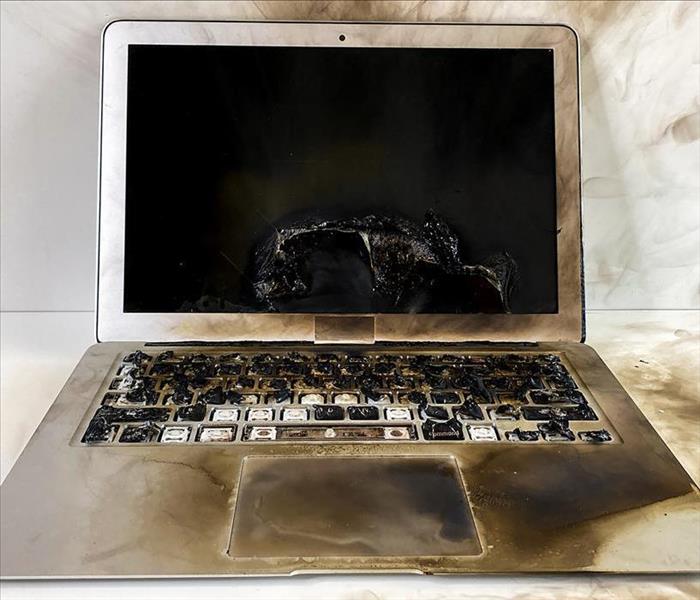 Smoke particles in your electronics can cause an electric fire in your Washington, NC home.
Smoke particles in your electronics can cause an electric fire in your Washington, NC home.
Many people don't realize it, but even flames from controlled fires such as a candle or cigarette can harm electronics simply by the smoke that fills the air. Smoke is a mixture of gases, solids, and liquid particles that can damage delicate electrical components. The damage is much worse when you have a Washington, NC, house fire, given the large, uncontrolled flames. Smoke and soot can cover every inch of the affected area. Fire cleanup professionals will tell you that smoke gradually builds up layer upon layer on and in electronic devices. This buildup attracts dust and other air particles, which accumulate, eventually causing the machine to overheat. This overheating can lead to an electrical fire. Smoke particles can cause circuit boards to behave erratically. This random behavior happens as a result of electrical currents flowing to unintended areas. To make matters worse, smoke also has an acidic property that will corrode materials that typically comprise electronics, such as metal, plastic, and glass. When soot is combined with moisture, it has similar corrosive effects.
How To Clean Electronics With Smoke Damage
1. Remove the Memory
First and foremost, it's vital to save the memory from the equipment. The memory could be more important than the device itself, and you can move it to a different piece of equipment if needed. Even if the equipment can't be restored, at least you can rescue what is saved on your removable memory. If you're not currently saving files to the cloud, it could be a game-changer for you. By doing this, you have access to your files wherever you are as long as you have an internet connection, and they are safe from disasters, so you'll always have an off-premises backup.
2. Power Off and Unplug
Next, you need to unplug the devices and keep the power off. Even being kept plugged in without being powered on can risk an electrical fire and avoid more potential damage. Leave them unplugged for at least 24 hours.
3. Look for Paperwork
Fire cleanup won't be needed for a device that's covered under warranty. Check any warranty information to see if it covers smoke damage.
4. Wipe Down the Device
Next, you'll need to begin the cleaning process. Remove the outer casing to assess the internal damage. Wipe down non-electronic parts with a damp cloth. You can use compressed air to spray all of the dust, debris, and soot off the delicate electrical components.
5. Let the Device Air Out
Finally, it's time to let everything air out so it can dry thoroughly. If you can leave it to air out for several days, it'll also remove some of the smoke odor.
Fire, smoke, and soot can do a lot of damage to electronics. Fire cleanup may not be successful on all of your smoke-damaged devices. However, if you can do it safely, it's worth trying before spending money on new ones. It's helpful to know beforehand the basics of how to care for electronics that have smoke damage. It could mean the difference between several hundred dollars if you're successful.
6 Ways To Reduce the Risk of a Space Heater Fire
8/26/2021 (Permalink)
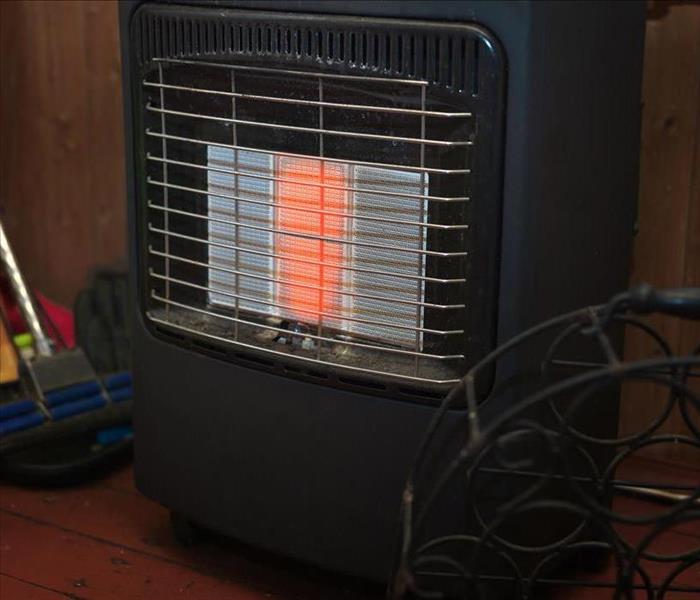 A space heater can provoke a fire in your Washington, NC, home. Knowing how to use it will reduce the risk.
A space heater can provoke a fire in your Washington, NC, home. Knowing how to use it will reduce the risk.
Space heaters are convenient, portable, and easy to use, making them excellent for warming up a chilly indoor area. There are many different kinds from which to choose from small ones you can put under your desk to large ones that will help keep a room toasty on those cold winter days. The kind you want to avoid at all costs is a burned space heater, which means knowing how to safely use these units. If you know what to do and not do with them and maintain them, they can be safe.
Here are some tips for reducing fire risk when using a space heater.
1. Inspect the Power Cord
Before plugging in your space heater each time, inspect the electrical socket in which you'll plug it. If you see any discoloration, avoid using that socket. Also, look at the power cord to make sure there are no signs of fraying or exposed wires. Also, always plug the space heater directly into the wall, not an extension strip. A space heater can overload the strip, causing a short circuit or fire.
2. Choose a No-Tip Model
Purchase a space heater with a low center of gravity, especially if you have children or pets. A tower heater or other slim designs can easily tip over. Make sure you get one made to shut off if it is tipped over, a common and essential safety feature on these units.
3. Opt for Auto Shut-Off
Most modern space heaters have an auto shut-off feature, but make sure the one you purchase has this feature. These heaters will automatically shut off if the unit overheats or malfunctions. Then, even a burned space heater shouldn't result in a burned home or contents.
4. Leave Space
One of the main precautions you need to take when using a space heater is to give it at least three feet clear of any objects on all sides. This means it also needs to be at least three feet from people or pet traffic. Also, keep it away from bed sheets, curtains, and other flowy materials that could catch fire. Keep the heater out of reach of children and pets, as they are naturally curious and don't know the dangers or risks of burns. They could also knock it over while running or playing.
5. Keep It Level
Fire damage restoration professionals who handle fire and smoke cleanup daily will tell you that one of the most common ways space heaters start fires is by tipping over onto flammable objects. Even if it has a low center of gravity, there's still a possibility that it could be tipped over or knocked off a surface. Make sure it's placed on a level, non-flammable surface. Also, make sure it's nowhere near water sources.
6. Turn It Off
It's tempting to leave a space heater running when it's cold. However, it's critical to turn it off and unplug it before leaving the house, leaving the room, or going to bed.
When your Washington, NC, home has a chill, a space heater can be a great option to make it warm and inviting. A burned space heater is a different story, though, so be sure to take these precautions when using this appliance.
Cooler weather may cause fires
7/29/2021 (Permalink)
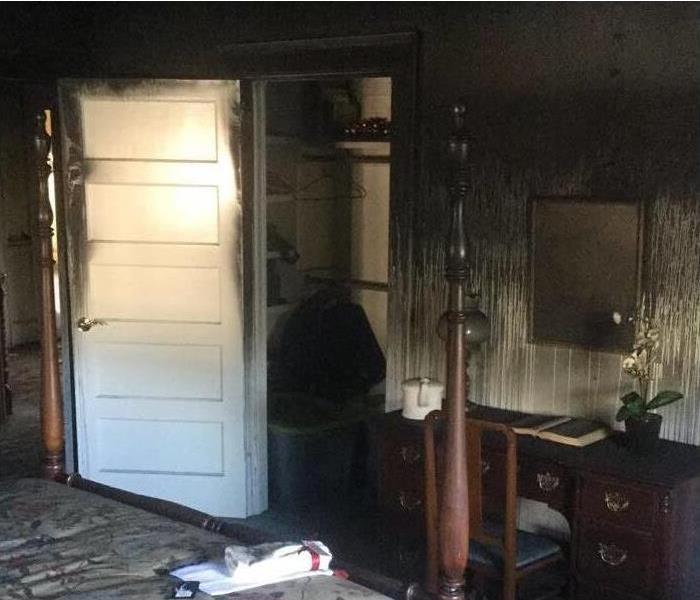 Even though the fire did not occur in this room, the smoke and soot traveled to the second floor.
Even though the fire did not occur in this room, the smoke and soot traveled to the second floor.
As we approach the cooler weather, fires increase inside the homes in Washington, NC. SERVPRO of Bath recently helped a homeowner who left a bulbed Christmas candle in the window which caught a curtain on fire. Almost the entire house was damaged as a result of this fire.
How to prevent fires at home:
Most people know the basics of fire safety at home, such as not leaving burning candles unattended and keeping a fire extinguisher on hand. Here are a few more things you can do to prevent fires at home.
- Have your heating system serviced regularly by a professional, including chimneys from wood-burning fireplaces. Clean around heat sources and keep dust and other flammable items away from ignition sources.
- Remove the lint from your dryer filter after every use. A clogged filter and lint trap makes your dryer less efficient, reduces the airflow needed to keep heat from building up in the vents, and forces lint onto the heating coils. Also, never let your dryer run when you are out of the house or when you’re asleep.
- Keep firewood, piles of leaves, and trash away from the home. If a grass fire starts nearby, these items next to your home could easily become kindling. Never dump hot ashes inside or near your home; keep them in a metal container well away from your house and garage.
- Avoid using outlet extenders or plug-in power bars: they can quickly overload an electrical circuit. Replace old, damaged, or frayed appliance cords, and never force a three-pronged plug into a two-slot outlet or extension cord.
- Store containers of cooking oil well away from the stove. When cooking with oil, never leave the stove unattended. To stop a grease fire, turn off the burner and place a lid on the pan to suffocate the flames, or pour on lots of baking soda. Never pour water on a grease fire or try to carry the pan outside; water splatters the grease and makes the fire bigger, and the pan will be much too hot to carry.
- Consider using borrowed heat to keep outdoor pets warm. During winter months, avoid using heat lamps, solar lamps, trouble lights, heated watering bowls, or other such heated devices, which could lead to a potential fire. Borrowed heat involves providing warmth from a heating system located in a separate building. If this isn’t possible, consider bringing your pets inside.
- Be sure to properly extinguish smoking materials. Smoking materials that are not properly extinguished can smolder undetected for days before igniting a fire. Never discard smoking materials on the ground or in plant pots.
Fire Safety when Burning Candles
6/2/2021 (Permalink)
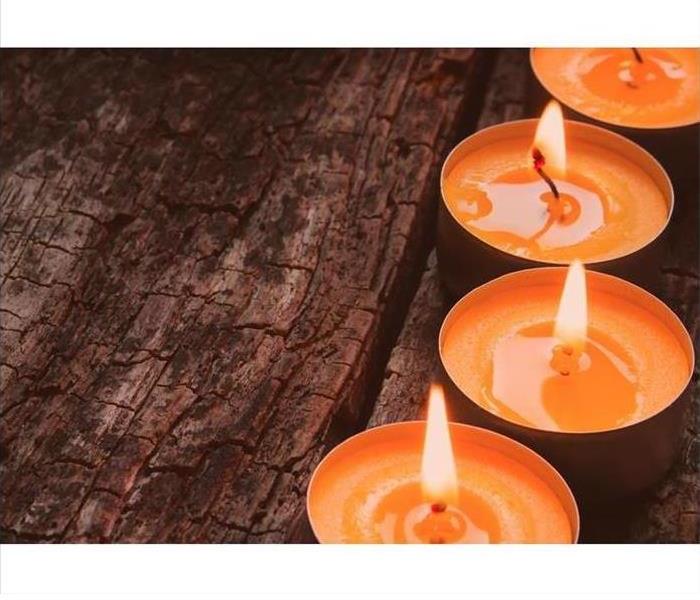 Use candles safely.
Use candles safely.
A lot of people enjoy burning candles for many different reasons. For some, it’s the tranquility and beauty of having a tad bit of light in a dim room. For others, it’s the smell the candle gives off, filling your house with a delightful scent. Whatever your reason may be, a candle is still an open flame that is a fire hazard. There are an estimated 8,700 house fires each year from burning candles.
Here are some safety tips to safely burn a candle inside your home.
Safety Tips To Use Candles
Before lighting your Candle
- Before you burn your candle, always trim your wick to 1/4 inch. Crooked or long wicks could cause uneven burning, flaring, or dripping. If you don’t have a wick trimmer, don’t worry, you can use nail clippers or scissors as well.
- Always use a candle holder. Candle holders are sturdy, heat resistant, and will catch any dripping.
- Burn candles in a well-ventilated room. Avoid air currents, vents, and drafts. This will help prevent excessive dripping, sooting, or uneven burning.
- Do not burn candle longer than 4 hours and give the candle 2 hours to cool before relighting.
- Use long matches or long-reach lighter when lighting your candle. Make sure you keep loose clothing and hair away from the flame.
While Candle is Burning
- Stop burning a candle when 2 inches of wax remains, never burn your candle all the way down.
- Never put a candle someplace where your child or pet could get a hold of it or knock it over.
- While your candle is burning keep it away from anything flammable. Curtains, books, bedding, furniture and paper.
- Never move a candle while it’s burning or while the wax is liquified.
- Never leave the room while a candle is burning, always put it out.
- Never use your candle as a night light.
When Putting out your Candle
- Never extinguish your candles flame with water. Water may cause the hot wax to splatter everywhere, causing the glass container to break.
- The safest way to put out your candle is with a candle snuffer.
- Before exiting the room, make sure your candle is completely out.
Enjoying the comfort of candles in your home can be nice and relaxing. Using these candle fire safety tips can help prevent a fire from starting.
SERVPRO of Bath Smoke and Soot Cleanup
6/2/2021 (Permalink)
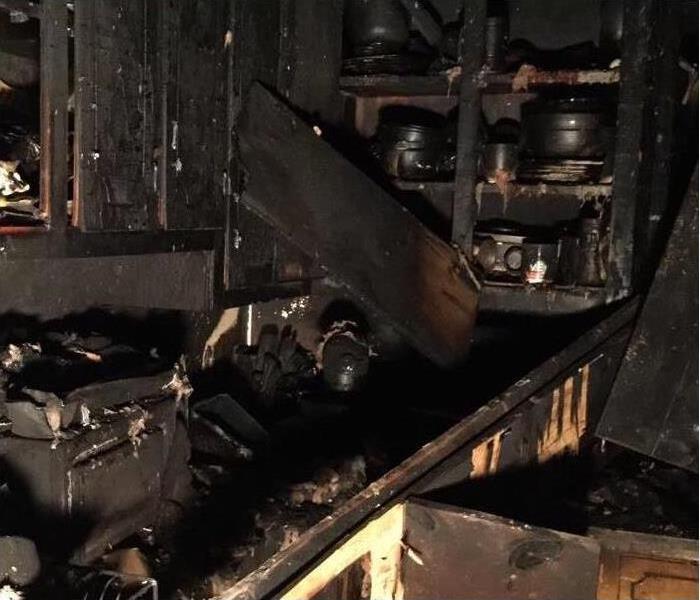 This picture is the aftermath of a kitchen fire at one of our customers homes. Smoke and soot damage can cause a strong odor in your home.
This picture is the aftermath of a kitchen fire at one of our customers homes. Smoke and soot damage can cause a strong odor in your home.
Smoke and soot is very aggressive and can penetrate various cavities within your home, causing hidden damage and odor. Our smoke damage expertise and experience allow us to inspect and accurately assess the extent of the damage to develop a plan of action.
Smoke and soot facts:
- Hot smoke travels to cooler areas and upper levels of a home or building.
- Smoke flows around plumbing systems, seeping through the holes used by pipes to go from floor to floor.
- The type of smoke may significantly affect your plan of action.
Different Types of Smoke
There are two different types of smoke–wet and dry. As a result, there are different types of soot residue after a fire. Before restoration begins, SERVPRO of Bath will need to test the soot to determine which type of smoke damage occurred. The cleaning procedures will then be based on the information identified during pretesting. Please see below for some additional information regarding smoke and residue:
- Wet Smoke – Plastic and Rubber- Low heat, smoldering, pungent odor, sticky, smeary. Smoke webs are more difficult to clean.
- Dry Smoke – Paper and Wood- Fast burning, high temperatures, heat rises therefore smoke rises.
- Protein Fire Residue – Produced by evaporation of material rather than from a fire. Virtually invisible, discolors paints and varnishes, extreme pungent odor.
Our Fire Damage Restoration Services
As you now know each fire and smoke damage disaster is unique. Each requires a unique solution to your situation. Here at SERVPRO of Bath we have the equipment, experience, and knowledge to restore your home or building. We will always treat your family with empathy and respect. Your property is treated with care and stored at our facility while repairs are being made.
Content Cleaning: A Vital Home Fire Recovery Step
5/28/2021 (Permalink)
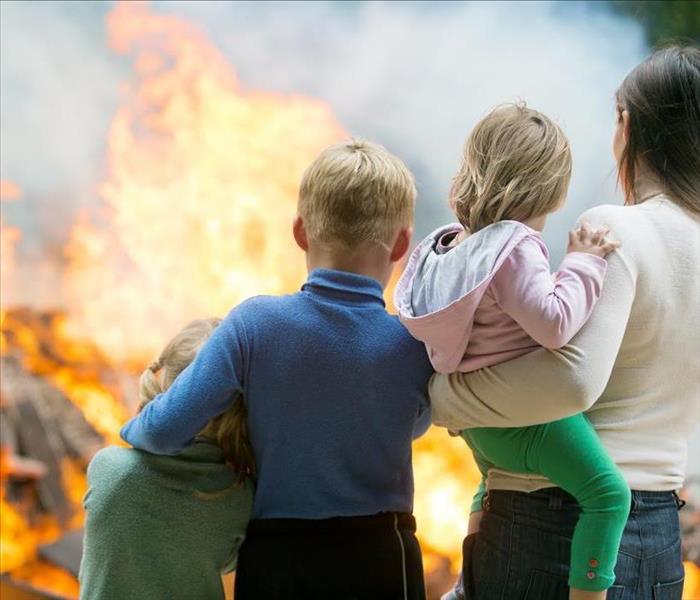 A home fire can be devastating
A home fire can be devastating
A home fire can be particularly destructive and disheartening; the cleanup and recovery efforts often continue for weeks after the flames have been put out. This is because, in addition to structures and belongings being burned, they may also be water-logged or affected by smoke. Multiple methods of content cleaning, such as dry-cleaning, are used by professionals to return your home to its original condition as quickly as possible:
- Dry and wet cleaning
- Spray and wipe services for sensitive belongings
- Foam cleaning for upholsteries
- Abrasive cleaning for stained and tough-to-clean belongings
- Immersion cleaning for specialized purposes
It's normal to want to understand what the content cleaning process entails.
Content Cleaning process
Storage for Fragile or Sensitive Belongings
Sometimes, fire damage cleanup crews will move your belongings into content storage for protection. For example, if you have valuable books or documents, they may be placed in frozen storage to preserve their quality until restoration experts can work on them. Some of the techniques used to save documents and photographs include dehumidification and vacuum thermal drying. Computers and other electronics may also be stored safely, so they aren't exposed to further damage while affected by acidic soot and humidity.
Specialized Cleaning for Fabrics and Textiles
Dry-cleaning is a valuable service that helps you avoid replacing clothing, linens, and other materials that were exposed to chemicals, smoke, and soot. It's important to note that the methods used by fire cleanup and restoration professionals are often more complex than those used by your local Washington, NC, cleaners:
- Controlled inventory and documentation
- Specialized smoke treatment for a variety of textiles
- Thorough cleansing for removal of smoke odors
Home fires cause enough concern without worry about where your clothes and bedding are and how they are being handled.
Recovery With Help From Professionals
A fire in your Washington, NC, home may be one of the most traumatic emergencies you can experience. The help of experienced professionals who can restore your home and clean your belongings with specialized methods, such as dry-cleaning, is an important part of fully recovering.
Tips for Cleaning Dryer Lint
2/23/2021 (Permalink)
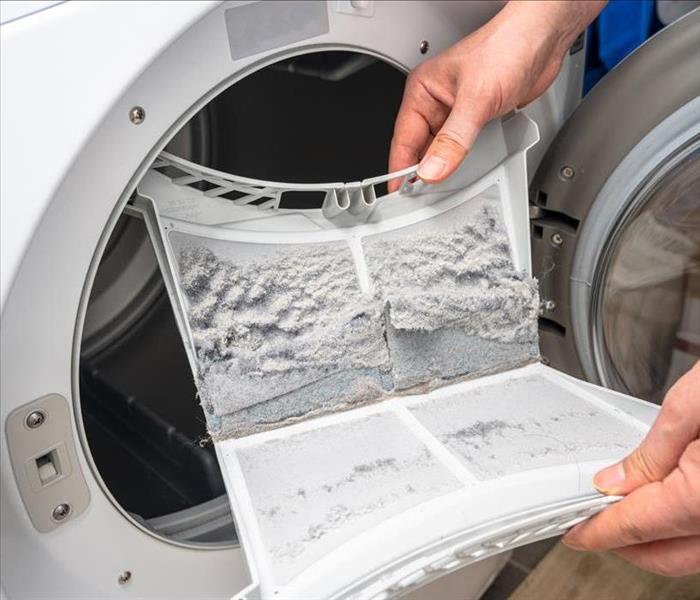 Cleaning the dryer lint on a frequent basis is the best way to prevent a lint fire.
Cleaning the dryer lint on a frequent basis is the best way to prevent a lint fire.
Having a washer and dryer in your home is convenient, but improper maintenance can pose a unique fire threat. To prevent a lint fire in your home in Washington, NC, you need to keep the combustible material away from heating elements. The best way to do this is to clean the lint out of the dryer on a frequent basis.
When to Clean the Dryer Lint
After Each Use
Every time you use your dryer, lint builds up on the removable screen. To prevent fire damage, you need to remove the lint at the end of every dry cycle. There are several ways to do this:
- Gather lint by hand
- Brush lint off screen with cleaning brush
- Vacuum lint off screen with hose attachment
If you are already using the vacuum hose to remove lint from the screen, go ahead and vacuum the inside area where the screen belongs before replacing it. This removes any lint that fell away when you were pulling the screen out. It's also a good idea to wash the screen with warm water occasionally, especially if you use fabric softener, as it can build up and clog the spaces that allow air to flow through.
Every Six Months
Even if you are diligent to clean the screen after every use, a lint fire could still happen if too much builds up in the exhaust hose or the machine itself. Fire restoration specialists recommend that you clean your dryer thoroughly every six months. After unplugging the machine, detach the exhaust hose from the wall and vacuum it out. Then remove the back panel of the machine and vacuum the accumulated lint out of its interior. Not only does this help prevent a dryer fire, it also helps your machine perform better.
Clothes create lint as they dry, and it's important to keep it away from the heating elements in the dryer. Regular maintenance can help prevent a lint fire and keep your dryer running well.
3 Fire Cleanup Tips
12/29/2020 (Permalink)
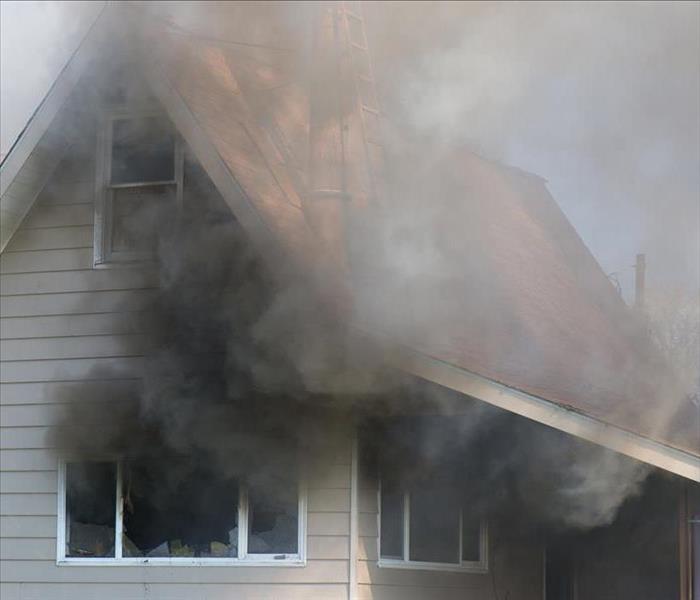 Fire damaged property.
Fire damaged property.
With proper cleaning, some property that has suffered smoke damage can be restored rather than replaced. These three fire cleanup tips can help you save some of your fire damaged property.
3 Tips For Fire Cleanup
1. Check the Labels on Your Clothing
Soot damage and odors can sometimes be removed from clothing by using products containing tri-sodium phosphate or bleach. However, these chemicals can damage some fabrics, so always read the labels on your clothing before using them. If the manufacturer's instructions indicate the clothing can be bleached, add four to six tablespoons of tri-sodium phosphate and one cup of bleach to every one gallon of warm water to be used for washing. As an alternative, you can add a tablespoon of pure vanilla extract to your regular laundry detergent.
2. Wash Your Walls To Remove Soot and Smoke
Mild soap or detergent or a mix of tri-sodium phosphate and bleach can be used to remove smoke damage from walls. Wear rubber gloves while working with these cleaners and clean one small area at a time. Start at the floor and work up to the ceiling to reduce streaking. Rinse surfaces with clear, warm water. Dry the walls thoroughly after smoke cleaning. Do not paint until the walls are completely dry. This technique can also be used to clean furniture and floors.
3. Replace Damaged Drywall and Insulation
Drywall and insulation that has become wet due to water used to put out a fire will not maintain structural integrity when dried out. You will need to have these materials removed and replaced to avoid potential mold problems. A fire mitigation team in Washington, NC, can assist you with drying out your property and removing any lingering odors, stains and other issues.
A fire in your home can leave behind smoke damage, soot and water. These tips can help you restore property that may otherwise need to be replaced.
The Importance Of Keeping Doors Closed.
8/19/2020 (Permalink)
Did you know nearly 60% of people sleep with their door open at night? That simple decision could mean life or death in the occurrence of a house fire. A closed door can slow the spread of flames, decrease toxic smoke, enhance oxygen levels, and reduce temperatures. The average time to escape a house fire as gone from 17 minutes to 3 minutes, due to the increased use of synthetics in furniture and home construction, flammable materials and contemporary open floor plans.
In addition to keeping your doors closed at night, it is important to keep your bedroom doors closed during the day while you’re away as well. If a fire starts in your home, the closed doors offer better protection to the personal items inside your bedroom. Also, it is important to get your children in the habit of closing their bedroom doors as well. Teach fire safety to your family and the importance of keeping doors closed.
Top Ten Things That Cause Home Fires
6/23/2020 (Permalink)
Kitchen Fires
Every home faces the potential for an assortment of risks with the most dangerous being a house fire. An accidental fire can occur from many items and can decimate a house in minutes if it is not handles properly and quickly. While proper insurance can help your financial loss, it is better to understand and try to prevent the situations that lead to house fires. Most homes have many combustible items.
This list is meant to help you not only identify potential issues but also lower the risk of having a house fire. Whether it’s a candle accidentally burning throughout the night, faulty cooking equipment or another scenario, homeowners should be aware of the most common causes of house fires and work to minimize and prevent accidents before they occur.
- Your Grill
During the outdoor cooking season, grills left unattended on a wooden deck or next to the wall of a home can cause a fire. A heated grill next to a wooden fence can easily cause fire, and grills can also ignite the exterior walls of a home or garage if they are placed too close.
9.Christmas Trees
Christmas trees are everyone’s holiday favorite and a staple of the holiday season, but they come with risks. Especially when the trees begin to dry out. A quick spark can set the whole tree on fire, so make sure to keep your tree’s water reservoir full and to unplug the tree when you are not at home.
- Faulty Wiring in Your Home
These fires erupt from overheating. To reduce this risk, make sure systems are installed properly with protective features.
- Kids Playing with Fire
Children are curious and sometimes get access to flammable objects which puts your property at risk. This includes matches, stove tops, candles and more. Make sure to keep lighters, candles, and matches away from the reach of small children.
- Candles
The lighters and matches utilized to light candles are just as dangerous as the candle themselves. Fires can start from unsupervised candles and children getting a hold of them.
- Electrical Equipment
These normally happen from short circuiting which causes sparks and ignites materials in your home. These are difficult to locate, because they are often hidden and a fire can begin burning before the homeowners know they have a problem
- Careless Smoking
Cigarette butts are a large perpetrator for house fires. They can be left unattended or dropped.
- Flammable liquids
Chemical fires occur from spontaneous combustion: a reaction of chemicals combining with oxygen producing enough heat to ignite. Be sure to store fuels and chemicals in proper containers that are protected from the heat.
- Heating Equipment
When in the presence of fabrics, space heaters and baseboard heaters can create a household fire. It’s recommended to never leave the house with any type of space heater running.
- Cooking Equipment
The most common of household fires come from cooking – this makes up almost half of all house fires. This can occur from grease and oil being overheated on the stove. For grease and oil to combust without needing direct flame contact, the open flames and ovens are left unattended and aren't attended until it is too late. Another source are portable cooking appliances such as toasters and electric griddles. These appliances must be cool to the touch before being stored away. Practice safety by making sure to clean pans to eliminate grease along with removing crumbs and scraps from toasters and electric griddles.
Contact SERVPRO of Bath if you need help after any type of household fire.
DIY after a fire is never a good idea, call the professionals at SERVPRO to help
6/23/2020 (Permalink)
Let SERVPRO of Bath help with your fire damage
Once your home Beaufort County, NC is affected by a fire, your main priority is getting your home cleaned and repaired. In many cases, this desire leads people to try and do the projects themselves. If this were your plan, you should reconsider. If the fire damage is of any significance, many concerns need to be addressed. Can you do all of things you need to do yourself?
Standing water left behind after fire extinguishing efforts of the local fire department have several important consequences. The resulting water damage can be furniture, electronics, clothing, drywall, ceilings, flooring, and more. Water removal must be done quickly. SERVPRO utilizes water pumps, wet-vacs, high-velocity fans and dehumidifiers to extract the water and moisture quickly, thereby mitigating the damage. Unfortunately, fire damage also comes with water damage.
The smoke damage that results from a fire can quite dangerous. Actually, the smoke left behind can become embedded in your furniture, flooring, carpets, and walls. If left unhandled, the smoke damage can remain in your property for years. Soot, another by-product of specific fires, needs special attention for proper clean up to avoid staining of walls and furniture. Effectively removing smoke requires the use of professional procedures and products that fire restoration specialists from SERVPRO of Bath have in their arsenal.
In many cases, homeowners who seek to complete the remediation process on their own will throw away items that can be saved. Instead, allow SERVPRO to assist you with this aspect of the restoration process. We will assess, inspect and inventory your property. These inventories affected household items and classifies them into non-salvageable, salvageable or questionable lists. Items can be containerized and cleaned at our facility by our IICRC-trained technicians.
If you attempt to complete the fire restoration process without professional assistance, the project will take a lot of time and probably lack positive results. However, hiring us to put your home back in a repaired, healthy condition enables you to feel confident of the restoration. Consider the effort, equipment, and training involved in successfully restoring your home to its pre-fire condition.
As a locally owned and operated business, SERVPRO of Bath is close by and ready to respond to your smoke or fire damage emergency in Washington, Bath and other surrounding areas. We are proud to be an active member of our community. Call us to help.
How to Prevent a Fire from Space Heaters
6/15/2020 (Permalink)
A sure sign of possible fire hazards is when temperatures drop and the days get shorter. While we’re all tempted to use electric blankets and space heaters to stay toasty and warm – however it’s important to remember to use caution when you use these - specifically don’t plug them into extension cords, even multiple extension cords. Space heaters generate a lot of energy and their heating elements can reach up to 600 degrees, which is why they should be plugged directly into a wall outlet. When hooked up to an extension cord the outlet can overheat and potentially catch fire.
The U.S. Consumer Product Safety Commission estimates that more than 25,000 residential fires are associated with the use of space heaters, causing 300 deaths every year
When buying and installing a small space heater, follow these guidelines:
- Purchase newer model space heaters which will have all of the current safety features. Make sure the heater carries the Underwriter's Laboratory (UL) label.
- Choose a heater that is controlled by a thermostat because they avoid the energy waste of overheating a room.
- Pick a proper size heater for the size of the room you are trying to heat. Most space heaters come with a general sizing table.
- Put the space heater on a level surface away from heavy foot traffic, and be especially careful to keep children and pets away from the heater at all times.
- And finally, plug directly into the wall outlet
As always during this time of need, make SERVPRO of Bath your first call if you need help and call your local insurance agent to assess any damages. We will work for you to restore your property and your life to make it "Like it never even happened."
Things that can cause a commercial fire
6/15/2020 (Permalink)
Every business faces the potential for an assortment of risks with the most dangerous of them being a business fire. An accidental fire can occur from many items and can easily decimate a business in minutes if it is not properly and quickly handled.
While proper insurance can help mitigate financial loss, it’s better to understand and work to prevent these situations that lead to commercial fires of any kind. Most businesses have many combustible items.
This list is meant to help business owners not only identify potential issues but also lower the risk of someone having a fire. Whether it’s a faulty equipment or any other scenario, business owners should be aware of these common causes of fires and work to minimize and prevent accidents before they occur.
Inadequate Wiring in The Business
These fires erupt from overheating. To minimize this from occurring, make sure systems are installed properly with protective features.
Electrical Equipment
These fires normally erupt from short circuiting which, causes sparking to ignite materials in the business. These are difficult to locate, because they can be hidden in locations and a fire can build before anyone knows about the situation.
Flammable liquids
Chemical fires occur from spontaneous combustion: this is a reaction of chemicals combining with oxygen to produce enough heat to ignite. Be sure to store fuels and other chemicals in proper containers that are protected from heat.
Heating Equipment
When in the presence of fabrics or other combustibles, personal space heaters and baseboard heaters can create a commercial fire. It is recommended to never leave with a space heater running.
Contact SERVPRO of Bath if you have any questions of if we can help you after a commercial fire.
SERVPRO of Bath Provides Storage and Pack-Outs After A Fire
6/5/2020 (Permalink)
Most property owners can agree that a fire can be one of the most harmful things that can happen to your home or business. The damage caused by a commercial fire could force a business to close permanently. And, sites that have storage units which are often outside of the main building, the chances of an accidental fire are greatly increased, specifically because a fire starting in a structure like this could go unnoticed longer, causing greater damage.
Businesses like these are prime candidates for commercial restoration needs after a fire causes damage to your property. Along with expert technicians, a restoration company can also offer temporary storage for your business's content while the building restoration is underway. SERVPRO of Bath has an excellent reputation in our community for fire and smoke damage restoration, from a quality standpoint, but also for being on time and on budget. If you need us, you can call us 24/7 for emergency services for both your business or home.
Pack out procedures can often be complicated, but SERVPRO of Bath provides reassurance to commercial business owners. We record the condition of your property and enter it into inventory. We create inventories and then we wrap and prepare each item for removal. SERVPRO’s specialty is restoration, but we’re also experts at organizing so we can move your contents to one of our climate-controlled storage areas. Commercial business owners can benefit from this because they only have to deal with one company, and one point of contact during a time that is already very stressful and challenging is helpful.
Once the removal of contents is complete, our trained and experienced team of technicians will begin work on the structure of your property. If your business requires a temporary closure, we can deodorize and clean your indoor air by using Ozone generators. These generators release unstable O3 particles into the air and those particles break down the odor-causing particles. By using these machines, we can eliminate odors from your property which will allow your staff to return to work quickly and under normal conditions.
Using a professional restoration company like SERVPRO of Bath can help your business and employees return to work sooner rather than later. Contact us today at 252-943-0213!
Commercial Fire Damage? Call SERVPRO!
6/5/2020 (Permalink)
SERVPRO has the experience and equipment to restore a fire damaged business quickly. Call us today!
There are different cleaning methods that can help restore commercial fire damage. When a business is affected by a fire, there are losses that go beyond the items damaged by the flames. Extended closure of your place of business leads to loss of revenue and could possibly lead to lost customers. The main aspect of restoring commercial fire damage is cleaning. And choosing the right company to help complete the cleaning process faster will help you save time, money, and more property. As a trained professional in the fire restoration industry, SERVPRO of Bath utilizes many cleaning techniques, which include:
- Abrasive Cleaning
- Immersion Cleaning
- Foam Cleaning
- Spray and Wipe
- Dry Cleaning
Cleaning a commercial fire could require more than one of the methods noted above. It could also require us to start with one type of approach and then progress to another, so it helps for both the professional and the business owner to keep an open mind. An example of this is when a fire leaves fine dry residue, it is smart to start with a dry-cleaning method before moving toward a wet cleaning method. Our trained technicians can use feather dusters, dry cleaning sponges, and dusting cloths to remove light dry debris.
Smoke and soot residue adhere to surfaces such as ceilings and walls, and these require extra effort to remove. Wet cleaning can provide better results compared to dry cleaning specifically because the saturation process helps loosen soils. Our team of technicians can use plain water during wet cleaning, but for even better results, they can also add cleaning agents to help break down soils. By using this approach, we can possibly eliminate the need to repaint the walls and ceiling of your business.
There may be a need to clean surfaces without saturating them. If there’s soot on an upholstered chair or couch, wetting the entire item will lengthen the cleaning process and could cause complications like shrinking or runny dyes. Our technicians try to avoid such complications by using the “spray and wipe” approach. This approach will regulate the amount of cleaning devices used. We can also utilize foam cleaning, which applies minimal cleaning solution to items.
A balanced cleaning approach is best for your business if it has suffered from fire damage. Call SERVPRO of Bath, we would be happy to help with your fire damage restoration process.
How to Clean Fire Damaged Fabrics
2/21/2020 (Permalink)
Cleaning Fabrics After a Fire Often Requires the Professionals at SERVPRO Bath
Fire creates smoke, and smoke can spread throughout an entire building or home. Because smoke rises with the heat and attaches to cooler surfaces, this can cause extensive damage to your property. Soot and soil residue are left behind from gases as the fire burns and touch surfaces throughout your home. Every room in your home and business can be affected because smoke travels. Many fire damage restoration projects in and around the Bath area often require a lot of soot removal and cleaning during the process. Different types of fires emit different kinds of smoke, based on the way it burns. SERVPRO Bath technicians employ a wide variety of cleaning techniques to clean different surfaces inside different spaces.
When technicians first arrive, their top priority is to test and clean your materials and belongings that were affected. To do this and begin the restoration process, the SERVPRO Bath team determines what can be salvaged and what soot removal process will be work best for each item.
Often times, items inside the home, like carpets and furniture are affected by soil and soot residues. Our trained team has the experience to know what types of methods to use when cleaning residues from fabrics based on the types of soot present. For example, because heat rises, many times carpet can be restored through a cleaning process. However, in some cases carpet collects the fallout of burnt smoke particles.
To clean carpets, SERVPRO technicians start by dry vacuuming the entire affected area. Our vacuums are equipped with high-efficiency filters that can be useful when removing light soot residues from fabrics. However, when soot residues are soaked deeper into carpets, we clean them with detergents and deodorizers.
If any of your upholstered items, such as furniture and draperies, get damaged, we can often remove the residue with dry cleaning methods. If the soot is only on the surface, vacuuming or dry sponges are usually able to get soils from upholstered furniture. In some cases, soot residues can cause furniture to stain. If this occurs, we can clean them with a one percent chlorine bleach cleaning solution to remove any stains.
If you have soot or soil residue following a fire, call SERVPRO of Bath at 252-923-0213.
Thanksgiving Fire Safety Tips
11/25/2019 (Permalink)
Thanksgiving is the first Holiday of the season where family you haven’t seen in a while, gather, celebrate, and eat. Although it’s a joyous and happy time, Thanksgiving is one of the worst days of the year for home fires. According to the National Fire Protection Association (USFA), the number of cooking fires on Thanksgiving is three times as high than any other day of the year.
Stovetops and Ovens
Sometimes cooks can be distracted by their guests, cooking fires can easily be prevented by following a few simple precautions:
- Remove food and grease buildup from burners, stovetop, and oven. Always start cooking with a clean stove and oven.
- Always stay in the kitchen while you’re cooking, don’t get distracted by trying to entertain your guests.
- Stay inside while cooking a turkey, set a timer, and check on it often.
- Keep a flame-resistant oven mitt, potholder, or lid nearby to smother any flames.
- Keep children away from the stove. It is recommended to use the back burners.
- If an oven fire occurs, turn off the heat and keep the door closed.
Turkey Fryers
Never use a turkey fryer on a covered patio, garage, or indoors because it’s a fire hazard risk. Fryers can easily tip over, spilling scalding, hot oil onto anyone nearby, leading to fires, burns, or other serious injuries. Never overfill the oil in a fryer, many turkey fires happen while the oil is being heated. Here are some safety tips for using a turkey fryer:
- Always read and follow the manufacturers guidelines.
- Completely thaw the turkey.
- Neve leave the fryer unattended.
- The oil will remain dangerously hot for hours, so keep children and pets away from the fryer.
- Only use the oil that is recommended. Different types of oil have different ignition temperatures.
- Allow two feet of space between the liquid propane tank and the fryer burner.
- Use well-insulated potholders or oven mitts, wear safety goggles to protect eyes from oil splatter.
- If oil starts smoking, immediately turn off the gas supply.
- Keep a fire extinguisher nearby.
- Never use water to extinguish a fire.
Enjoy spending time with family this Thanksgiving and remember to be thankful. Also remember these safety tips so you and your family can have a safe and wonderful Thanksgiving.
Space Heater Safety Tips
11/15/2019 (Permalink)
Although it is still Fall, it feels like Winter is already here, with temperatures reaching mid to low 30s. Keeping your house warm can be a struggle and many people turn to space heaters to help get the job done. If you use space heaters to help with warmth, check out these safety tips to ensure they don’t pose a hazard to you, your family and your home.
- Always follow the 3 feet rule. Ensure you keep heater 3 feet away from beds, curtains, papers, sofas, or anything that could cause a fire due to too much heat.
- Make sure the heaters plug is securely plugged into the power outlet, so that it doesn’t come loose and fall out.
- Make sure your heater is on level surface. This helps ensure it doesn’t pose a risk of getting knocked over.
- Turn the heater off whenever you are unable to keep an eye on it.
- Before you start to use your heater, make sure you smoke alarm and carbon monoxide detectors are working properly.
- Plug your heater directly into the wall, if you must use an extension cord use a 14-gauge wire or larger.
- NEVER use heater near water or in damp like conditions.
Share these tips with your family and friends to ensure they’re using their heaters properly.
Take time for Fire prevention this Fall
11/15/2019 (Permalink)
For those ready to warm up their homes, the National Fire Safety Protection Association offers the following tips to help minimize fire risks in your home:
- Have your furnace inspected and serviced by a professional.
- Have chimneys and vents cleaned and inspected by a professional. Make sure they are checked for creosote buildup, which is the leading cause of chimney fires.
- Make sure wood burned in the fireplace is dry and seasoned.
-Remind children to stay at least three feet away from fireplaces, oil stoves, and space heaters.
- Make sure your space heaters have an automatic shut off and those shutoffs are functioning.
- Test your smoke alarms and carbon monoxide detectors to ensure they are functional.
-Review your family's fire escape plan and what to do in case of a fire.
- Dried flowers, cornstalks, and crepe paper catch fire easily. Keep away from open flames and other heat sources like light bulbs and heaters.
Common Causes of Household Fires
8/30/2019 (Permalink)
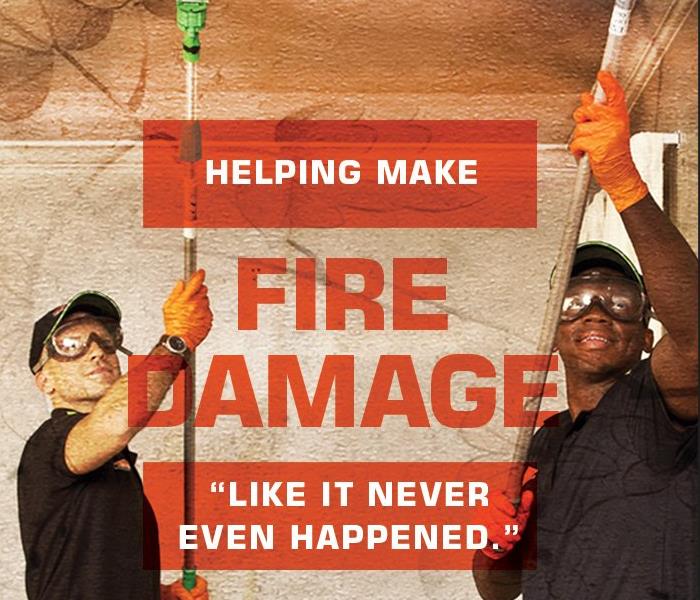 Let SERVPRO restore your home to pre-fire condition.
Let SERVPRO restore your home to pre-fire condition.
A house can easily catch fire from the misuse of appliances to smoking in bedrooms. You can take measures to avoid a fire in your home and ensure the safety of your family. Below are some of the most common causes of household fires, and some tips to take precautions.
Cooking Equipment
Pots and pans can overheat and cause a fire very easily if the person cooking gets distracted and leaves cooking unattended. Always stay in the room, or ask someone to watch your food, when cooking on hotplates.
Heating
Keep portable heaters at least 5’ away from anything that could easily catch fire such as furniture, curtains, laundry, clothes and even you. If you have a furnace, get it inspected once a year to make sure it is working to safety standards.
Smoking in bedrooms
Bedrooms are best to be kept off-limits for smoking. A cigarette that is not put out properly can cause a flame, as the butt may stay alit for a few hours. It could burst into flames if it came into contact with flammable materials, such as furniture. Did you know that fires started in the bedroom or lounge, make up 73% of all house fire fatalities?
Electrical Equipment
An electrical appliance, such as a toaster can start a fire if it is faulty or has a frayed cord. A power point that is overloaded with double adapter plugs can cause a fire from overuse of electricity. A power point extension cord can also be a fire hazard if not used appropriately. Double-check the appliances and power points in your home.
Candles
Candles look and smell pretty, but if left unattended they can cause a room to easily burst into flames. Keep candles away from any flammable items such as books and tissue boxes. Always blow a candle out before leaving a room. Did you know that in Perth last year 34 house fires started as a result of candles?
Curious Children
Kids can cause a fire out of curiosity, to see what would happen if they set fire to an object. Keep any matches or lighters out of reach of children, to avoid any curiosity turned disaster. Install a smoke alarm in your child’s room and practice a home escape plan with your children and family in case there was a fire. Inform your kids about the importance of knowing their address and if they needed to, call 911.
Faulty Wiring
Homes with inadequate wiring can cause fires from electrical hazards. Some signs to see if you’ve bad wiring are: 1) Lights dim if you use another appliance; 2) For an appliance to work, you have to disconnect another; 3) Fuses blow or trip the circuit frequently. Have a licensed electrician come and inspect your house, or contact your landlord if you have any of the above occurrences.
Barbecues
Barbecues are great for an outdoor meal, but should always be used away from the home, tablecloths or any plants and tree branches. Keep BBQs regularly maintained and cleaned with soapy water and clean any removable parts. Check the gas bottle for any leaks before you use it each time.
Flammable Liquids
If you have any flammable liquids in the home or garage such as petrol, kerosene or ethylated spirits, keep them away from heat sources and check the label before storing. Be careful when pouring these liquids.
Lighting
Lampshades and light fittings can build up the heat if they are very close to light globes. Check around the house to make sure. Lamp bases can become a hazard if they can be knocked over easily, and so should be removed if they are. Check that downlights is insulated from wood paneling or ceiling timbers.
The above tips are a good guide to avoiding a fire in your home. If you do have a fire and need assistance with the cleanup, please call SERVPRO of Bath!
Top 6 Fire Damage Restoration Tips
7/19/2019 (Permalink)
We’re not going to kid you. Fire damage restoration is tough work. People call SERVPRO of Bath frequently to ask for advice on how to clean up after a fire. Most people can put these six tips into practice. But remember that fire damage restoration takes time, work, and skill. Realistically consider whether you want to try these ideas on your own or whether you’d be better off hiring highly trained restoration specialists who will guarantee their work.
Here are six of the best tips we give people who ask about fire damage restoration:
Remove Smoke Damage
With any fire, you’ll have a degree of smoke damage to your walls, wall paper, and paint. If the smoke damage is not too serious, you should be able to scrub it clean with detergents and bleach. Soot from smoke damage is greasy stuff, so always try to dust as much of it off from a surface before trying to scrub the surface clean. Often, you’ll want to repaint it, but make sure all surfaces are clean and dry before you paint.
Limit Activity & Other Simple Fire Damage Restoration Steps
Until your house is restored, limit your activity and movement in the house. This helps prevent soot particles from being embedded into upholstery and carpets. Keep people’s hands clean so you don’t further soil upholstery, walls, and woodwork. Protect your things by placing clean towels or old linens on rugs, upholstery, and carpet traffic areas. Before you clean know the best cleaning method for that particular cleaning job (one example: Clean and protect chrome with a light coating of petroleum jelly or oil.) Wash both sides of the leaves on your houseplants. Change your HVAC filter, and tape double layers of cheesecloth over air registers.
Get Rid of Mold & Mildew
Firefighters are great. They save many lives and many homes. But they do introduce mold and mildew into houses when they must use water to extinguish the fire. SERVPRO of Bath highly recommends you hire fire damage restoration professionals to deal with mold and mildew. Mold and mildew can cause serious health problems. It’s difficult for a nonprofessional to know for certain if he’s cleaned up all the areas affected by the mold and mildew. And mold and mildew can contaminate your furniture, carpets, clothing, mattresses, walls, and vents. The best thing you can do immediately is to air out every room and clean out all vents and filters.
Replace Carpets. Clean and Dry Your Floors.
Your floors and carpets end up absorbing the worst of the damage from all the water used to put out a fire. In almost every case, SERVPRO of Bath recommends that you pull up any carpets that have water damage and replace them. Water can also seep underneath vinyl flooring and into the cracks in hardwood. You must address this. If you have experience with flooring, you can lift it up and clean under it. But you may want to call a professional fire damage restoration company to assist you.
Avoid Smearing Soot Into Clothing
Cleaning smoke damage from clothing is one of the biggest jobs you’ll have after a fire. Make sure you don’t smear greasy soot into the clothing or just throw the smoky clothes in the wash. Often times dry cleaning is the best bet, and you should ask around local dry cleaners if any have experience with post-fire laundry.
Scrub, Soak, and Cleaning Dishes
Dishes are also important items to clean thoroughly after a fire because they will be in contact with your food. Scrub all dishes well, let them soak in a solution of bleach and water (2 tablespoons of bleach per gallon) for at least 20 minutes and scrub some more for safety. When in doubt, if a dish, pot, or pan won’t come clean, cut your losses and throw it out – especially rubber or wooden dishes that absorb smoke.
Help is Here
Call SERVPRO of Bath @ 252-923-0213
Top 6 Fire Restoration Tips
7/19/2019 (Permalink)
We’re not going to kid you. Fire damage restoration is tough work. People call SERVPRO of Bath frequently to ask for advice on how to clean up after a fire. Most people can put these six tips into practice. But remember that fire damage restoration takes time, work, and skill. Realistically consider whether you want to try these ideas on your own or whether you’d be better off hiring highly trained restoration specialists who will guarantee their work.
Here are six of the best tips we give people who ask about fire damage restoration:
Remove Smoke Damage
With any fire, you’ll have a degree of smoke damage to your walls, wall paper, and paint. If the smoke damage is not too serious, you should be able to scrub it clean with detergents and bleach. Soot from smoke damage is greasy stuff, so always try to dust as much of it off from a surface before trying to scrub the surface clean. Often, you’ll want to repaint it, but make sure all surfaces are clean and dry before you paint.
Limit Activity & Other Simple Fire Damage Restoration Steps
Until your house is restored, limit your activity and movement in the house. This helps prevent soot particles from being embedded into upholstery and carpets. Keep people’s hands clean so you don’t further soil upholstery, walls, and woodwork. Protect your things by placing clean towels or old linens on rugs, upholstery, and carpet traffic areas. Before you clean know the best cleaning method for that particular cleaning job (one example: Clean and protect chrome with a light coating of petroleum jelly or oil.) Wash both sides of the leaves on your houseplants. Change your HVAC filter, and tape double layers of cheesecloth over air registers.
Get Rid of Mold & Mildew
Firefighters are great. They save many lives and many homes. But they do introduce mold and mildew into houses when they must use water to extinguish the fire. SERVPRO of Bath highly recommends you hire fire damage restoration professionals to deal with mold and mildew. Mold and mildew can cause serious health problems. It’s difficult for a nonprofessional to know for certain if he’s cleaned up all the areas affected by the mold and mildew. And mold and mildew can contaminate your furniture, carpets, clothing, mattresses, walls, and vents. The best thing you can do immediately is to air out every room and clean out all vents and filters.
Replace Carpets. Clean and Dry Your Floors.
Your floors and carpets end up absorbing the worst of the damage from all the water used to put out a fire. In almost every case, SERVPRO of Bath recommends that you pull up any carpets that have water damage and replace them. Water can also seep underneath vinyl flooring and into the cracks in hardwood. You must address this. If you have experience with flooring, you can lift it up and clean under it. But you may want to call a professional fire damage restoration company to assist you.
Avoid Smearing Soot Into Clothing
Cleaning smoke damage from clothing is one of the biggest jobs you’ll have after a fire. Make sure you don’t smear greasy soot into the clothing or just throw the smoky clothes in the wash. Often times dry cleaning is the best bet, and you should ask around local dry cleaners if any have experience with post-fire laundry.
Scrub, Soak, and Cleaning Dishes
Dishes are also important items to clean thoroughly after a fire because they will be in contact with your food. Scrub all dishes well, let them soak in a solution of bleach and water (2 tablespoons of bleach per gallon) for at least 20 minutes and scrub some more for safety. When in doubt, if a dish, pot, or pan won’t come clean, cut your losses and throw it out – especially rubber or wooden dishes that absorb smoke.
Help is Here
Call SERVPRO of Roanoke Rapids @ 252-537-3473
Fire Damage? Lower Your Fire Clean-Up Costs!
7/19/2019 (Permalink)
Fire damage is terrible as it is. Let’s not make things worse by spending more money than necessary to restore your fire damaged home. Many times, you can save money and keep property damage to a minimum through something called emergency mitigation services.
Saving Fire Damaged Possessions
Fire damaged property that may look like it needs to be replaced may actually be recoverable. A fire restoration company can save many an heirloom- But act quickly. Prompt fire cleanup and restoration is important because the items found in your home – furniture, carpet, walls, drapes, and even ceilings – can absorb smoke. If too much time elapses between when the fire damage occurs and when fire cleanup occurs, the effects of smoke damage can last for months.
Time Can Cost You Many Possessions
The more time between the fire and restoration, the more costs you incur and the fewer items you can restore. Depending on the extent of the fire damage, you may be able to save clothing, leather, books, photographs, kitchen items, furniture, and more.
Restored to Pre-Loss Condition
SERVPRO of Bath cleans and deodorizes restorable items, sometimes to preloss condition. So, don’t throw anything out until you’re certain it must be replaced. Save your property and save money. Now that’s a win-win!
Call SERVPRO of Roanoke Rapids at 252-537-3473 to discuss. We’re the fire restoration and clean up company that has saved property and money for the owners of fire damaged homes.
Top 6 Fire Damage Restoration Tips
7/2/2019 (Permalink)
We’re not going to kid you. Fire damage restoration is tough work. People call SERVPRO of Bath frequently to ask for advice on how to clean up after a fire. Most people can put these six tips into practice. But remember that fire damage restoration takes time, work, and skill. Realistically consider whether you want to try these ideas on your own or whether you’d be better off hiring highly trained restoration specialists who will guarantee their work.
Here are six of the best tips we give people who ask about fire damage restoration:
Remove Smoke Damage
With any fire, you’ll have a degree of smoke damage to your walls, wall paper, and paint. If the smoke damage is not too serious, you should be able to scrub it clean with detergents and bleach. Soot from smoke damage is greasy stuff, so always try to dust as much of it off from a surface before trying to scrub the surface clean. Often, you’ll want to repaint it, but make sure all surfaces are clean and dry before you paint.
Limit Activity & Other Simple Fire Damage Restoration Steps
Until your house is restored, limit your activity and movement in the house. This helps prevent soot particles from being embedded into upholstery and carpets. Keep people’s hands clean so you don’t further soil upholstery, walls, and woodwork. Protect your things by placing clean towels or old linens on rugs, upholstery, and carpet traffic areas. Before you clean know the best cleaning method for that particular cleaning job (one example: Clean and protect chrome with a light coating of petroleum jelly or oil.) Wash both sides of the leaves on your houseplants. Change your HVAC filter, and tape double layers of cheesecloth over air registers.
Get Rid of Mold & Mildew
Firefighters are great. They save many lives and many homes. But they do introduce mold and mildew into houses when they must use water to extinguish the fire. SERVPRO of Bath highly recommends you hire fire damage restoration professionals to deal with mold and mildew. Mold and mildew can cause serious health problems. It’s difficult for a nonprofessional to know for certain if he’s cleaned up all the areas affected by the mold and mildew. And mold and mildew can contaminate your furniture, carpets, clothing, mattresses, walls, and vents. The best thing you can do immediately is to air out every room and clean out all vents and filters.
Replace Carpets. Clean and Dry Your Floors.
Your floors and carpets end up absorbing the worst of the damage from all the water used to put out a fire. In almost every case, SERVPRO of Bath recommends that you pull up any carpets that have water damage and replace them. Water can also seep underneath vinyl flooring and into the cracks in hardwood. You must address this. If you have experience with flooring, you can lift it up and clean under it. But you may want to call a professional fire damage restoration company to assist you.
Avoid Smearing Soot Into Clothing
Cleaning smoke damage from clothing is one of the biggest jobs you’ll have after a fire. Make sure you don’t smear greasy soot into the clothing or just throw the smoky clothes in the wash. Often times dry cleaning is the best bet, and you should ask around local dry cleaners if any have experience with post-fire laundry.
Scrub, Soak, and Cleaning Dishes
Dishes are also important items to clean thoroughly after a fire because they will be in contact with your food. Scrub all dishes well, let them soak in a solution of bleach and water (2 tablespoons of bleach per gallon) for at least 20 minutes and scrub some more for safety. When in doubt, if a dish, pot, or pan won’t come clean, cut your losses and throw it out – especially rubber or wooden dishes that absorb smoke.
Help is Here
The team at SERVPRO of Bath also has specialized training and experience in fire restoration services, natural disaster prevention, water damage, chemical cleanup, and natural disaster cleanup. Call SERVPRO of Bath at (252) 923-0213 anytime.
Fire Damage? Lower Your Fire Clean-Up Costs!
6/24/2019 (Permalink)
Fire damage is terrible as it is. Let’s not make things worse by spending more money than necessary to restore your fire damaged home. Many times, you can save money and keep property damage to a minimum through something called emergency mitigation services.
Saving Fire Damaged Possessions
Fire damaged property that may look like it needs to be replaced may actually be recoverable. A fire restoration company can save many an heirloom- But act quickly. Prompt fire cleanup and restoration is important because the items found in your home – furniture, carpet, walls, drapes, and even ceilings – can absorb smoke. If too much time elapses between when the fire damage occurs and when fire cleanup occurs, the effects of smoke damage can last for months.
Time Can Cost You Many Possessions
The more time between the fire and restoration, the more costs you incur and the fewer items you can restore. Depending on the extent of the fire damage, you may be able to save clothing, leather, books, photographs, kitchen items, furniture, and more.
Restored to Pre-Loss Condition
SERVPRO of Bath cleans and deodorizes restorable items, sometimes to preloss condition. So, don’t throw anything out until you’re certain it must be replaced. Save your property and save money. Now that’s a win-win!
Call SERVPRO of Bath at 252-923-0213 to discuss. We’re the fire restoration and clean up company that has saved property and money for the owners of fire damaged homes. Whether you’re in Washington, Williamston, Columbia, Windsor or Swan Quarter; or anywhere in between, we can help.
Smoke Damage
4/10/2018 (Permalink)
 Call SERVPRO of Bath today. We are here to help!
Call SERVPRO of Bath today. We are here to help!
SERVPRO of Bath has many years experience withcommercial buildings and personal homes when it comes to fire damage.
Typically a fire has damage from water when putting out the fire. Even though areas were not physically on fire, the smoke damage usually penetrates throughout the building.
Getting the smell of smoke out of any building regardless of the cause (for example grease fire) can be extremely challenging. Walls must be washed down with special solutions to remove odor and/or paint that traps the smoke odor. Sometimes a fire can cause smoke damage in the ducting of the building.
Knowing the difference between what can be cleaned and what cannot be cleaned comes with training and experience and will save our clients thousands of dollars. SERVPRO invests a lot of time and money to ensure you have the best of both. If you had smoke damage to your commercial building or personal home, SERVPRO of Bath is here to help.
After the fire, then reconstruction must begin. Many times this may be the ideal time to some remodeling such as removing a wall completely to open your floor plan, or adding a room. One of our retail clients was able to increase the height of their second floor since a new roof had to added. A tragedy can sometimes turn into a blessing.
With over 60 years combined experience as unlimited licensed builders, we can HELP!
Call SERVPRO of Bath at
252-923-0213.
Did You Know There Are Different Types Of Smoke?
2/13/2018 (Permalink)
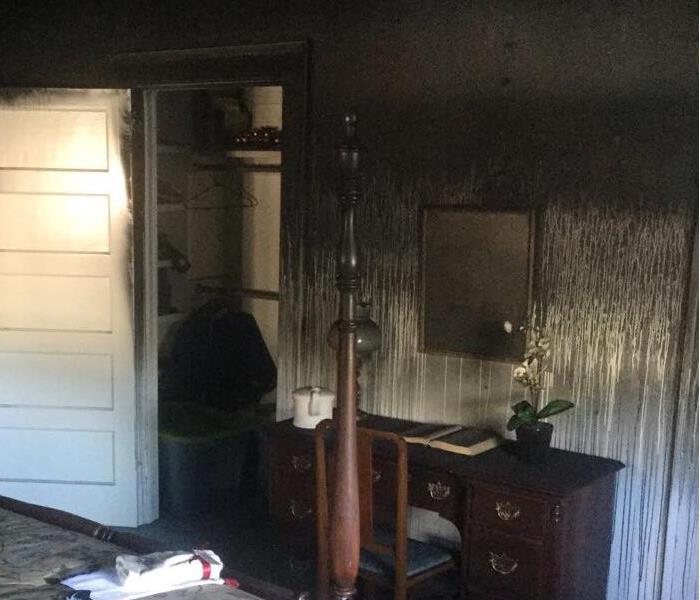 Room with extensive smoke damage from house fire.
Room with extensive smoke damage from house fire.
the first step in a fire is to determine what caused the fire we can start to decide on what equipment and cleaning materials to use in the effective areas. The different types of smoke are below:
Wet Smoke happens when rubber and/or plastic burn. These types of fires burn at a lower temperature than other types of fires. Since the plastic/rubber burned it will leave behind an overpowering odor and will leave behind a pasty residue.
Dry Smoke occurs when papers and wood are burning. Paper and wood burn very quickly and at a high temperature. These types of fire will cause a lot of damage to the ceilings and even into attics.
Soot smoke this type is when there is a malfunction with the furnace and HVAC system. When this happens, it will put smoke throughout the home through vents. Before cleaning and repairs can happen, the furnace will need to be replaced or repaired. Then the vents in your home can be cleaned so that left over smoke does not continue to go through your home.
When you have fire and/or smoke damage in your home, call SERVPRO of Bath to help you assess the damage, be your advocate with your insurance company and remediate and repair the damages.
SERVPRO OF BATH
252-923-0213
Covering Beaufort, Hyde, Martin, Tyrell and Washington Counties. Our second franchise SERVPRO of Roanoke Rapids covers an additional 5 counties in Eastern North Carolina.
Fire Safety
1/30/2018 (Permalink)
 One of our clients homes caught on fire a few months ago. Here we are replacing one of the roof trusses.
One of our clients homes caught on fire a few months ago. Here we are replacing one of the roof trusses.
Many of us know fire 101 in our homes. We know not to leave an open flame such as, a candle or gas stove stop unattended. Even though we may feel comfortable with our knowledge of fire safety here are a few tips and reminders:
- Have a fire extinguisher on in your home. Fire extinguishers play a crucial role in protecting your home during the very early stages of fire.
- Avoid overloading your outlets or outlet extenders. They can easily over heat if they are being over used. Check on your outlets as often as you can. Make sure to replace any that may be getting worn out or old.
- When doing laundry, remember to empty link tray from dryer on every use. When the lint is not cleaned it can cause the dryer to heat to a higher temperature. Therefore, the machine will have to work harder and also work at a lower efficiently.
- Make sure space heaters are at least 2-3 feet away from furniture, window treatments, bedding, clothing, rugs, and other combustibles. These items can cause a risk of fire if they come in contact with the unit.
- Check to see if smoke alarms are working every month and replace batteries twice a year.
Heating the Garage
1/17/2018 (Permalink)
With a winter that has been colder than normal, no one likes to walk out of the comfort of their warm home and into a very cold garage. A few months ago, one of our friends installed a mounted gas heater in his personal home (many other home owners and/or business owners have used space heaters as another option). The heather has made the space much more enjoyable to be in while working or just simply getting into your car. Even though heaters have many pros, there are a few cons; At times you can become anxious thinking the heater could catch fire. Here are a few tips when having a space heater in your space:
- Do not leave space heaters unattended. If you are not going to be home or going to bed turn off the heater.
- Make sure the heater is in a proper area. One that is staple and no chance of falling over.
- Be sure to check it surrounding areas, check for water or other close items that could cause a problem.






 24/7 Emergency Service
24/7 Emergency Service















